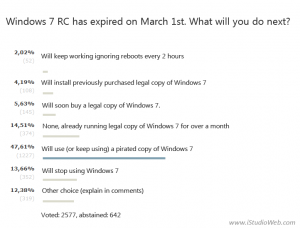This poll appeared on one of the most popular Russian IT social blogs – Habrahabr. The question was simple – now that Windows 7 RC has expired as of March 1, what is your next move? 47% of respondents answered that they already run a stolen (pirated) copy of Windows 7 or will do so now. Below is a screenshot of the poll with English translation. If you want Russian wordings (although dimmed out) hit the cut.
Category: piracy
Russian court found the owner of AllOfMP3 not guilty of breaching the copyright. Now, if I can only go to Russia and open a video store, something like AllOfDivX…
Given how much publicity the case with Russian teacher Ponosov got (here’s the link to the latest on Wired) I think I also have to shed some light on it, given that most people don’t really understand what’s really going on. However, bear in mind – I am not a lawyer, so whatever you may find below is my personal perception based on knowing the situation in Russia just a bit better then folk on this side of ocean.
Is a nutshell – the principal (called director of school, basically the administrator who runs whole 11-grades establishment between kindergarten and university/college) got apprehended by Russian authorities for having a classroom with computers without Windows licenses on them. As the case unfolded, it was established (judging by information from public sources) that he bought computers with Windows already preinstalled.
Now, this is a spot where I need to stop and make some things clear. Most of schools in Russia don’t have computers, let alone money to pay for the software. However, as it was uncovered in this case, the problem was that Ponosov allegedly bought computers from some third-party that installed unlicensed copies.of operating system. Where did the difference in money go, of course, was not disclosed. Again, it wasn’t Microsoft who chased the guy, it was Russian authorities for good solid reason.
Next thing you know – Mikhail Gorbachev (when did he surfaced?) asks Bill Gates to intervene, Putin is personally overseeing the process, Microsoft (as always) gets all the blame, Ponosov claims he’s not guilty even after he was offered to settle things outside of the court and then – boom!, case dismissed.
Now why would anybody want to have a process like that? Personally, I see several goals of such thing, even though at first glance the whole thing looks like an exercise in moronity:
- Putin shows to the world that he fights piracy in his country. The fact that in real life in Russia nobody cares about piracy is somehow gets forgotten. No, really, you think someone with salary around $200 – $500 a month could afford buying an OS that costs about that? Plus the Office? Especially when pirated copies cost around $5 – $10 per CD with every possible version of Windows on it? Give me a break.
- (whoever was behind this idea) got the message out very loud and clear – stop using
Windowsproprietary/commercial in Russia. Why? Because you never know if and when authorities will come after you. However, with Linux/OpenOffice combo, there are no licensing fees to pay, no restrictions, therefore it’s just plain safe to use. - this puts additional pressure on software companies that sell their products in Russian market to lower the price. Not because Russian companies cannot afford it, but because Russian consumers don’t want to pay for it. In simple language – they wouldn’t buy the product if there is any way they can steal it. Practically no amount of meetings, agreements and even discounts would change that type of psychology any time soon. Of course, with larger companies the situation is different, but on the end-consumer market it is considered plain old idiocy to pay for Windows.
First two bullet points are pretty obvious to anyone who have been following (anti)piracy news from Russia. Third one has a very long history, which I have neither time nor wish to go through. Just to summarize the whole thing – it seems very interesting how Russian-produced PR actions get a lot of people very emotional. Looks like they got some kind of gurus back there in Moscow. Nice job, guys.